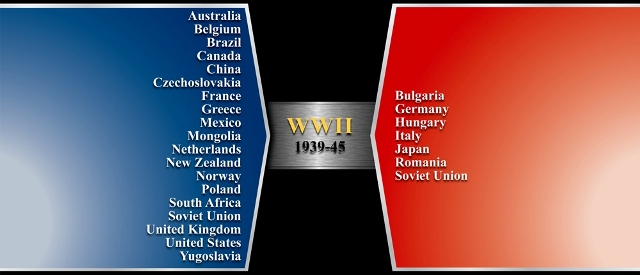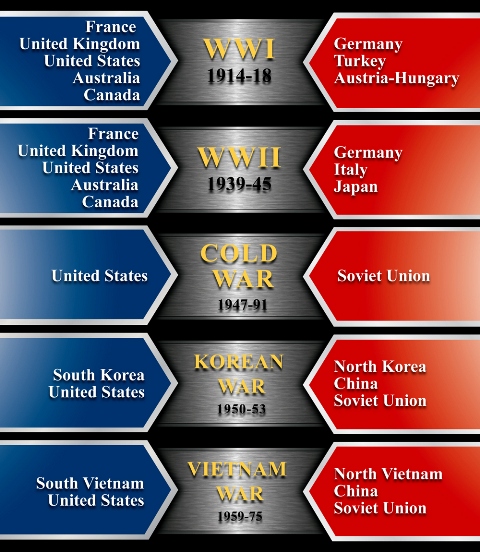In “Philosophy and a Century of War,” I left the Soviet Union out of my discussion of World War II, for reasons not clear or convincing to everyone. So let me lay out my thought process.
I started with a semi-complete list of the belligerents on both sides. It looks like this:

From outside perspective, not all of those countries are equally important to explaining why the war occurred, and some of them are involved for reasons other than the 20th-century pattern I want to explain, so I set them aside.
But there’s also the oddity that the Soviet Union appears on both sides. The USSR first partnered with Germany. In 1939 they agreed to divide Poland between them: the Nazis invaded Poland in early September, and the Soviets invaded in mid-September. So we get this:

Two years later, the Germans turned on the Russians. Big shock! Betrayal! The Germans felt able to attack the Soviets because the war on the Western front had gone well for them. So as a matter of mutual desperation, the Western powers and the Soviets allied for the rest of the war. So we get this:

Now the big step. I think the Soviets are a side issue to explaining why the war occurred. They were initially opportunist in taking a deal offered by Germany to split Poland in return for protecting Germany’s back. And when Germany reneged on the deal, the Soviets reluctantly had to fight and to ally with the hated capitalists. In both cases, the Soviet Union was the more passive, reactive partner. The real initiators and causal factors lay elsewhere. So I cut the Soviets out in order to focus on this pattern:

And that is the context for my nine-minute story: “Philosophy and a Century of War”.
Italy should also be placed on both sides in WWII. Allied with Germany before the fall of Mussolini in 1943, Italy declared war on Germany afterward. The Germans then killed many Italians including the uncle of a friend of mine.
Good point, Michael.
I understood perfectly why the Soviet Union was left out. I think the fact that you had to break down the role of the USSR during WWII is telling. There were a lot of half-truths and bold faced lies about Stalin and his monstrous regime. Those lies still exist today. And let’s not forget the poor quality of education where history is rarely taught, if at all.
The difference is between tactics and principle (which ought to, but too rarely align). In a democracy a neo-Nazi or Marxist will promote freedom of expression as a tactic to be swiftly set aside in the event they achieve political power, whereas an advocate of Enlightenment liberalism will promote it as a principle. A cruder example: If a gangster fleeing a rival gangster runs into a cop and pleads for protection we would not interpret it as a principled stand against murder.
Scherie: I would be interested to know what lies about Stalin you’re referring to. My mother lived indirectly under Stalin for several months after WW II in the Russian sector of Berlin but left on noticing her friends disappear one by one. A Ukrainian friend’s mother survived the Holodomor: if the subject was broached she became hysterical.
Edward:
The lies I’m referring to are the wholesale white washing of Stalin’s regime to justify the US allied with the Soviet Union. I thought I was clear in my comment. Plus when there is a discussion of totalitarianism, Nazism is seen as the worse. Whereas, Communism is not seen as negative even though Communism caused more destruction and lasted longer than Nazism.
Scherie: OK, thanks for clarifying. I wasn’t clear on the context or who was promoting the half truths and lies. Yes, Hitler’s carnage, if perhaps more concentrated and virulent, was surpassed in sheer scale by those waving the banner of Marx, though the latter was more hidden from Western eyes by “iron [and bamboo] curtains.”
The West had the benefit of defeating and overrunning Germany after the war, exposing and recording the evidence of its horrific crimes, whereas we did not have that benefit with regard to the Gulag, Holodomor, Great Terror, Great Leap Forward, Cultural Revolution, Qey Shibir and Killing Fields.
Also, as others have pointed out, while leftist and rightist totalitarians fancied themselves polar opposites – though not above ad hoc alliances such as the Molotov-Ribbentrop Pact – they were two offshoots of the same philosophic root and shared the same mystical-collectivist-totalitarian premises. Italian dictator Benito Mussolini began as a socialist and shaped his theory of Fascism deeply influenced by, among others, the syndicalism of Marxist’ Georges Sorel. Later Pol Pot, heavily influenced by the writings of Marx and Lenin, the French Communist party (which he joined as a student in Paris) and Maoism would blend Marxian and rightist völkisch elements into a genocidal program to realize a classless, ethnically pure Khmer society.
Western and Middle Eastern fundamentalists share an understandable misperception about secular humanism, seeing it as a monolithic homogeneous entity: the cause of Fascism, Nazism, socialism-Marxism and a host of present-day evils. For many it’s virtually synonymous with socialism.
I think it’s important to get out the message that nothing could be further from the truth i.e. that what is called secular humanism is in fact a deadly embrace of two intertwined yet utterly opposed traditions: The Enlightenment and a reaction to it that distilled and surpassed in virulence the darkest themes of traditional religion, while carefully couching itself in the former’s sensibility and terms e.g. “scientific socialism.” (When have we heard a scientist refer to “scientific physics”?).